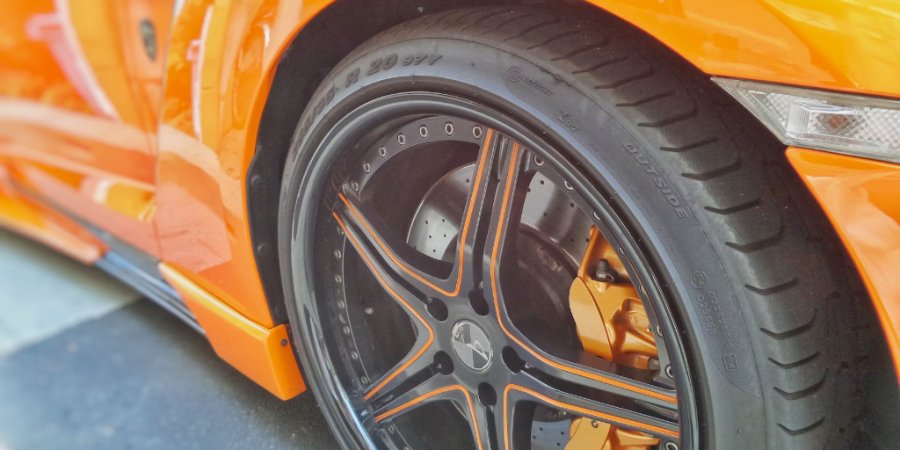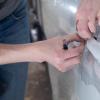What Causes a Car to Jerk when Braking?

When your car jerks abruptly when you hit the brakes, it can be a cause for concern. There are several potential causes for this issue, and understanding them can help you address the problem effectively.
Potential Causes
One common culprit for a jerking car when braking is worn brake pads or rotors. Over time, these components can become thin or warped, resulting in uneven braking. When you apply the brakes, the worn brake pads or rotors may not provide consistent contact with the wheels, causing your car to jerk. This can be not only uncomfortable but also potentially dangerous, as it affects your ability to stop smoothly.
Another possible cause of a jerking car when braking is a malfunctioning brake caliper. The brake caliper is responsible for applying even pressure to the brake pads, which then press against the rotors to slow down the vehicle. If the brake caliper is stuck or not working properly, it can lead to uneven brake pressure. As a result, your car may jerk when you apply the brakes, as one wheel may be braking more forcefully than the others.
Additionally, issues with your vehicle's suspension or alignment can also contribute to a jerking motion when braking. A misaligned vehicle or worn suspension components can create instability and uneven weight distribution when you hit the brakes. This can cause your car to jerk as it tries to compensate for the imbalance, resulting in an erratic stopping motion.
It's worth noting that these are just a few of the potential causes for a jerking car when braking. Other factors, such as a malfunctioning ABS system or a problem with the brake fluid, can also contribute to this issue. To accurately diagnose the problem, it's best to consult with a trusted mechanic or brake specialist who can inspect your vehicle and provide an expert assessment.
Common symptoms of a jerking car when braking
If your car jerks when you hit the brakes, you may experience several common symptoms that can help pinpoint the issue. By paying attention to these signs, you can provide valuable information to your mechanic and facilitate the diagnosis and repair process.
One of the most obvious symptoms of a jerking car when braking is the actual jerking motion itself. When you apply the brakes, you may feel a sudden jolt or shudder, as if the car is lurching forward or sideways. This can be alarming and unsettling, especially if you're not expecting it. The intensity of the jerking motion may vary depending on the severity of the underlying problem.
Another symptom to look out for is unusual noise when braking. If your car jerks when you hit the brakes, you may hear grinding, squealing, or scraping sounds. These noises can indicate that your brake pads or rotors are worn down and need to be replaced. The uneven braking caused by worn brake components can create friction and generate these alarming sounds.
You may also notice that your car takes longer to come to a complete stop. When the braking system is compromised, it may require more time and distance to slow down and bring your vehicle to a halt. This can be particularly dangerous in emergency situations, as the delayed response time can increase the risk of accidents.
In some cases, a jerking car when braking may also be accompanied by a vibrating sensation. As you hit the brakes, you may feel a pulsation or vibration coming from the steering wheel, brake pedal, or even the entire vehicle. This can be a sign of warped rotors or other issues with the braking system that require attention.
By paying close attention to these symptoms, you can provide valuable information to your mechanic, who can then diagnose and address the underlying problem effectively.
Potential issues with the braking system
When your car jerks when braking, it's important to consider the potential issues with the braking system that may be causing this problem. By understanding these issues, you can have a clearer idea of what needs to be addressed to fix the jerking motion.
One of the most common issues with the braking system that can cause a jerking car when braking is worn brake pads or rotors. As mentioned earlier, over time, brake pads can become thin and worn down, while rotors can become warped. This can result in uneven braking, as the worn brake pads or rotors may not provide consistent contact with the wheels. As a result, your car may jerk when you hit the brakes.
Another potential issue is a malfunctioning brake caliper. The brake caliper is responsible for applying even pressure to the brake pads, which then press against the rotors to slow down the vehicle. If the brake caliper is stuck or not working properly, it can lead to uneven brake pressure. This can cause one wheel to brake more forcefully than the others, resulting in a jerking motion when you apply the brakes.
Misalignment or worn suspension components can also contribute to a jerking car when braking. When the suspension or alignment of your vehicle is off, it can create instability and uneven weight distribution when you hit the brakes. This can cause your car to jerk as it tries to compensate for the imbalance, resulting in an erratic stopping motion.
Other potential issues with the braking system that can cause a jerking car when braking include a malfunctioning ABS (Anti-Lock Braking System) and problems with the brake fluid. The ABS system is designed to prevent wheel lock-up during braking, allowing for better control and stability. If the ABS system for an automobile is not functioning properly, it can lead to uneven braking and cause your car to jerk. Similarly, if there is an issue with the brake fluid, such as air bubbles or contamination, it can affect the performance of the braking system and result in a jerking motion.
Understanding these potential issues can help you communicate effectively with your mechanic or brake specialist, enabling them to diagnose and address the specific problem with your vehicle's braking system.
How to diagnose the problem
Diagnosing the problem causing your car to jerk when braking requires a systematic approach and the expertise of a trained mechanic or brake specialist. While it can be tempting to try to diagnose and fix the issue yourself, it is highly recommended to seek professional help to ensure an accurate assessment and appropriate repairs.
To diagnose the problem, your mechanic will typically begin with a visual inspection of the braking system. They will check the condition of the brake pads, rotors, and calipers. If they notice any signs of wear, unevenness, or damage, they may recommend replacement or repair.
In addition to the visual inspection, your mechanic may also perform a test drive to observe the jerking motion firsthand. They will pay attention to the symptoms you described and assess the overall performance of the braking system. During the test drive, they may also listen for any unusual noises or vibrations and take note of the braking distance and responsiveness.
To further diagnose the problem, your mechanic may also use specialized diagnostic tools and equipment. They may perform a brake fluid test to check for contamination or air bubbles, as well as use a brake lathe to measure the thickness and smoothness of the rotors. These tools can provide valuable data and help identify the underlying issue causing the jerking motion.
Once the problem has been diagnosed, your mechanic will provide you with a detailed explanation of the issue and recommend the necessary repairs or replacements. It's important to follow their advice and address the problem promptly to ensure your safety on the road.
Remember, diagnosing the problem accurately requires the expertise and experience of a professional. Trying to diagnose and fix the issue yourself can be risky and may lead to further damage or safety hazards. Always consult with a trusted mechanic or brake specialist for an accurate assessment and appropriate repairs.
Steps to fix a jerking car when braking
Fixing a jerking car when braking requires addressing the underlying issue with the braking system that is causing the problem. The specific steps to fix the issue will depend on the diagnosis provided by your mechanic or brake specialist. However, here are some general steps that may be involved in the repair process.
- Brake pad and rotor replacement: If worn brake pads or rotors are causing the jerking motion, your mechanic may recommend their replacement. This involves removing the old brake pads and rotors and installing new ones that are in optimal condition. This can help restore even braking and eliminate the jerking motion.
- Brake caliper repair or replacement: If a malfunctioning brake caliper is the culprit, your mechanic may repair or replace the caliper. This involves removing the faulty caliper and installing a new one or fixing the existing one. Ensuring that the brake caliper is functioning properly is crucial for even brake pressure and smooth braking.
- Suspension and alignment adjustments: If misalignment or worn suspension components are contributing to the jerking motion, your mechanic may recommend suspension and alignment adjustments. This may involve aligning the wheels properly, replacing worn suspension components, or addressing any other issues that may be affecting the stability and balance of your vehicle.
- ABS system repair: If a malfunctioning ABS system is causing the jerking motion, your mechanic may repair or replace the faulty components. This may involve diagnosing and fixing electrical or sensor issues, ensuring that the ABS system is functioning correctly, and providing consistent braking.
- Brake fluid flush and replacement: If the brake fluid is contaminated or contains air bubbles, your mechanic may recommend a brake fluid flush and replacement. This involves draining the old fluid, flushing the system with new fluid, and ensuring that there are no contaminants or air bubbles present. Proper brake fluid is essential for optimal brake performance and smooth braking.
It's important to note that these steps are general guidelines and the specific repairs required will depend on the diagnosis provided by your mechanic. Following their recommendations and addressing the specific issues identified is crucial for fixing the jerking motion and ensuring your safety on the road.
Tips to prevent car jerking when braking
While some causes of a jerking car when braking may be unavoidable, there are several preventive measures you can take to minimize the risk of this issue. By following these tips, you can maintain a well-functioning braking system and reduce the likelihood of experiencing jerking motions when you hit the brakes.
- Regular brake inspections: Schedule regular brake inspections with a trusted mechanic or brake specialist. They can assess the condition of your brake pads, rotors, calipers, and other components to ensure they are in good working order. Regular inspections can help identify and address potential issues before they escalate and cause jerking motions.
- Replace worn brake pads and rotors: As brake pads and rotors wear down over time, it's crucial to replace them promptly. Worn brake pads and rotors can create uneven braking and increase the risk of jerking motions. Follow the manufacturer's recommendations for replacement intervals, or consult with your mechanic for guidance.
- Maintain proper brake fluid levels: Check your brake fluid levels regularly and top them up as needed. Low brake fluid levels can affect the performance of the braking system and contribute to jerking motions. If you notice a significant decrease in brake fluid levels, it's important to have your vehicle inspected for leaks or other issues that may be causing the loss of fluid.
- Avoid sudden, aggressive braking: Abruptly slamming on the brakes can put unnecessary stress on the braking system and lead to jerking motions. Try to anticipate stops and brake gradually and smoothly. This not only reduces the strain on the braking system but also promotes a safer driving experience.
- Drive cautiously over rough terrain: When driving over rough or uneven terrain, be mindful of the impact it can have on your vehicle's suspension and alignment. Rough roads can exacerbate misalignment or cause additional wear and tear on suspension components, potentially leading to jerking motions when you hit the brakes. Drive cautiously and avoid excessive speed over rough terrain.
- Be mindful of heavy loads: If you regularly carry heavy loads in your vehicle, be aware that it can put additional strain on the braking system. The added weight can cause uneven braking and contribute to jerking motions. If you frequently transport heavy loads, consider having your brakes inspected more frequently and ensure they are in optimal condition.
By following these preventive measures, you can reduce the risk of experiencing jerking motions when braking and maintain a reliable and safe braking system.
When to seek professional help
If your car jerks when braking, it's important to seek professional help promptly. Ignoring the issue can compromise your safety and the safety of others on the road. Here are some signs that indicate it's time to consult with a trusted mechanic or brake specialist:
- Persistent jerking motion: If your car consistently jerks when you hit the brakes, it's a clear indication that there is an issue with your braking system. Even if the jerking motion is subtle or intermittent, it's best to have it inspected by a professional to identify and address the underlying problem.
- Unusual noises or vibrations: If you hear grinding, squealing, or scraping sounds when you apply the brakes, or if you feel vibrations or pulsations, it's a sign that something is wrong with your braking system. These symptoms should not be ignored, as they can indicate worn brake components or other issues that require attention.
- Increased braking distance: If you notice that your car takes longer to come to a complete stop or requires more distance to slow down, it's a cause for concern. This can be particularly dangerous in emergency situations, as it compromises your ability to stop quickly and safely.
- Changes in brake pedal feel: If you notice changes in the feel of the brake pedal, such as increased resistance, sponginess, or a lack of responsiveness, it's a sign that there may be an issue with your braking system. These changes should not be ignored, as they can indicate problems with brake fluid, calipers, or other components.
- Dashboard warning lights: If your car's dashboard warning lights, such as the ABS or brake warning lights, illuminate, it's an indication that there is a problem with the braking system. These lights should not be ignored, as they are designed to alert you to potential issues that require attention.
If you experience any of these signs, it's crucial to reach out to a trusted mechanic or brake specialist as soon as possible. They can diagnose the problem accurately and provide the necessary repairs or replacements to ensure your safety on the road.
Conclusion
According to experts who write for us on automobiles, It's important to be aware of the signs that can indicate a problem with your car's braking system, as not addressing the issue can compromise your safety and the safety of others on the road. If you experience any of these warning signs, it's essential to consult with a trusted mechanic or brake specialist as soon as possible. They can diagnose the problem accurately and provide the necessary repairs or replacements to ensure your car is safe and functioning properly. Taking proactive steps to maintain and inspect your braking system is essential for keeping yourself and other drivers safe on the road.
More to Read:
Previous Posts:



